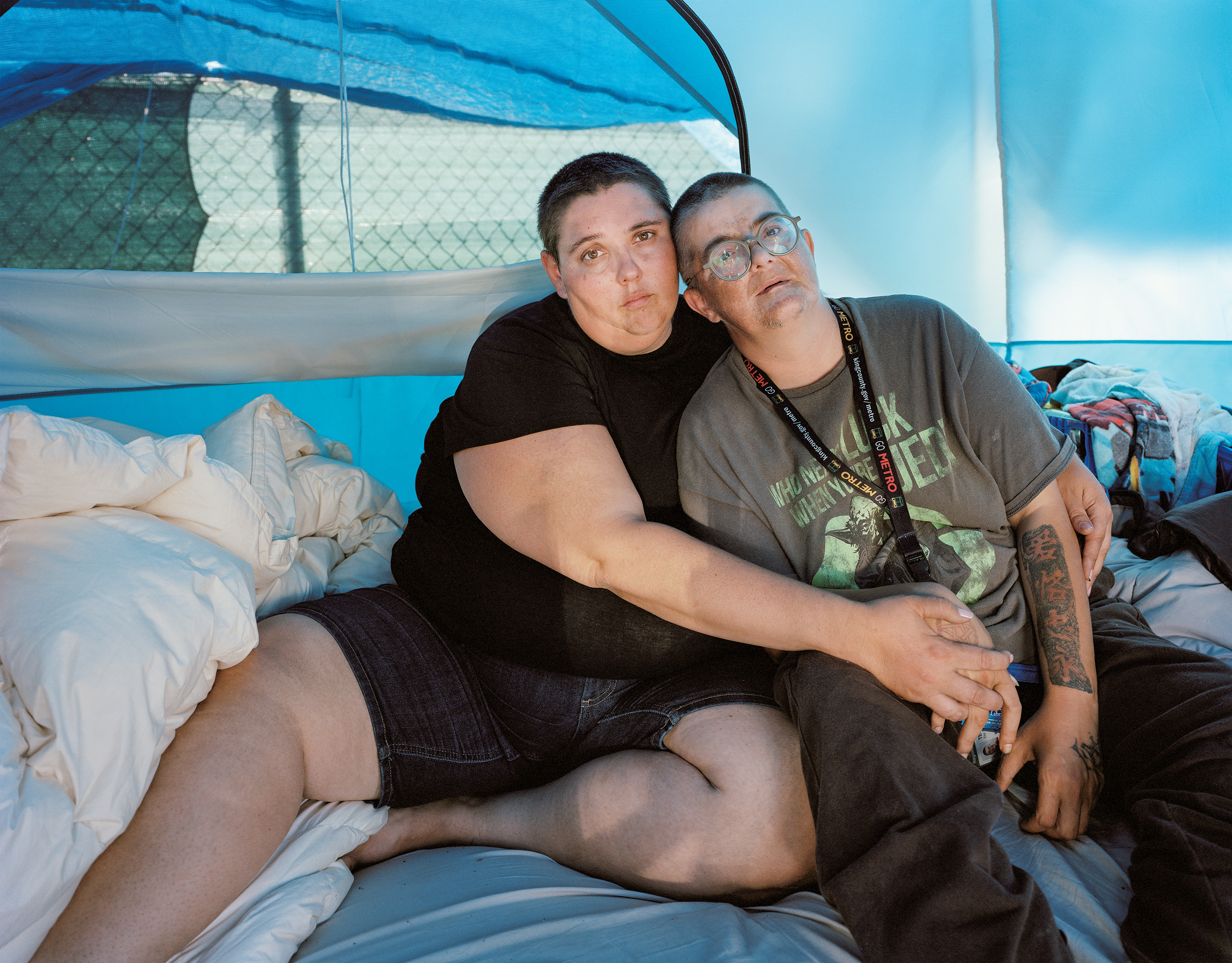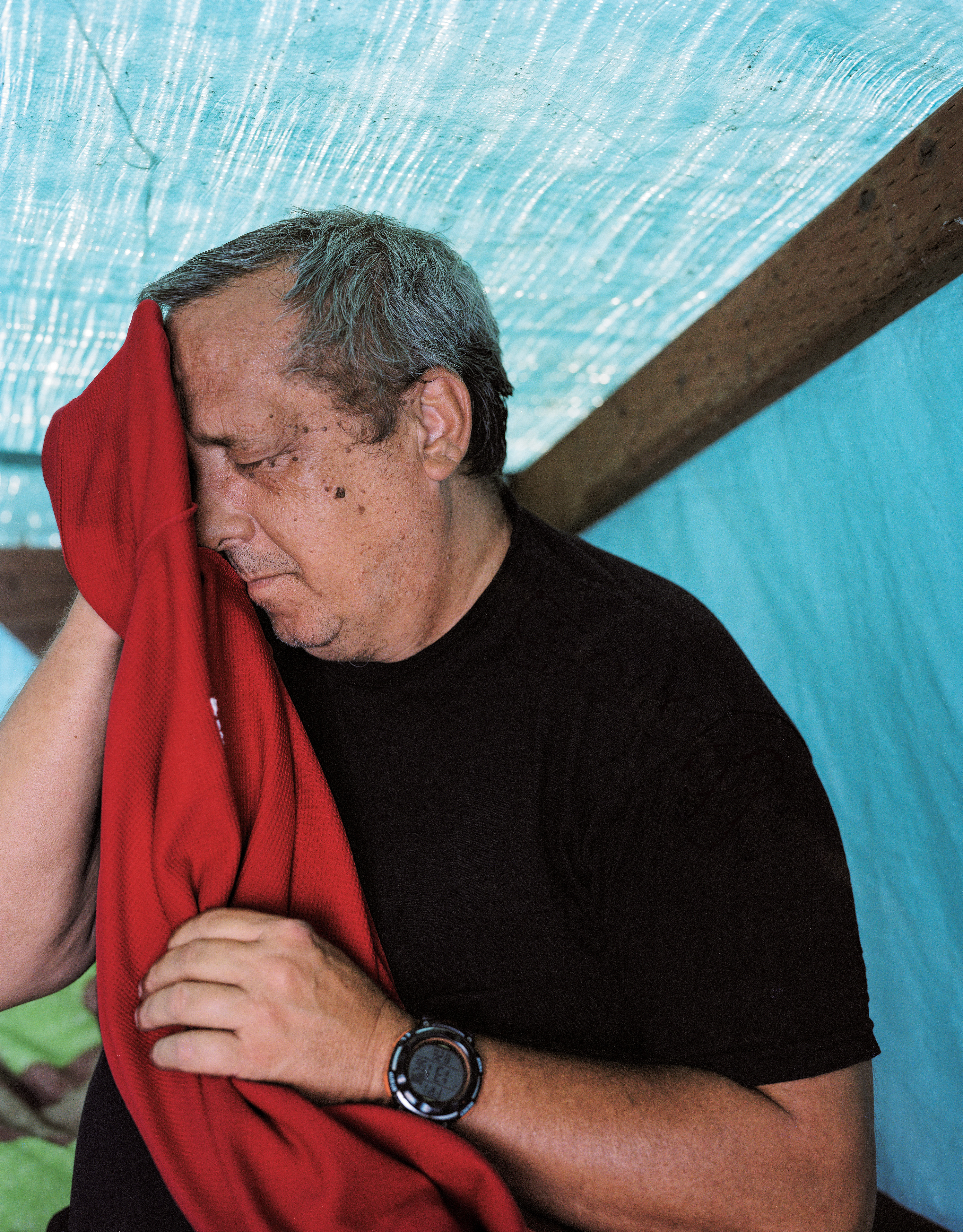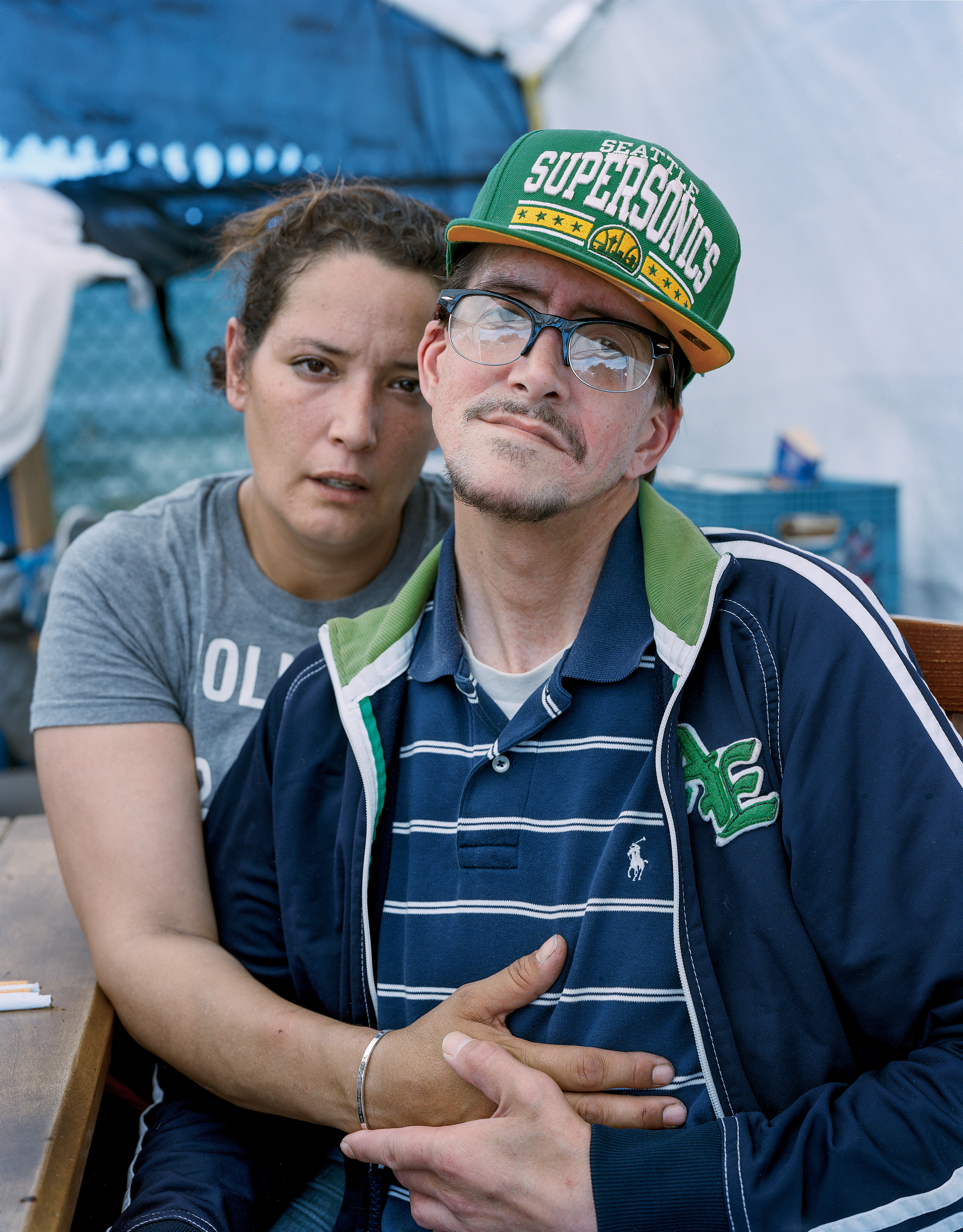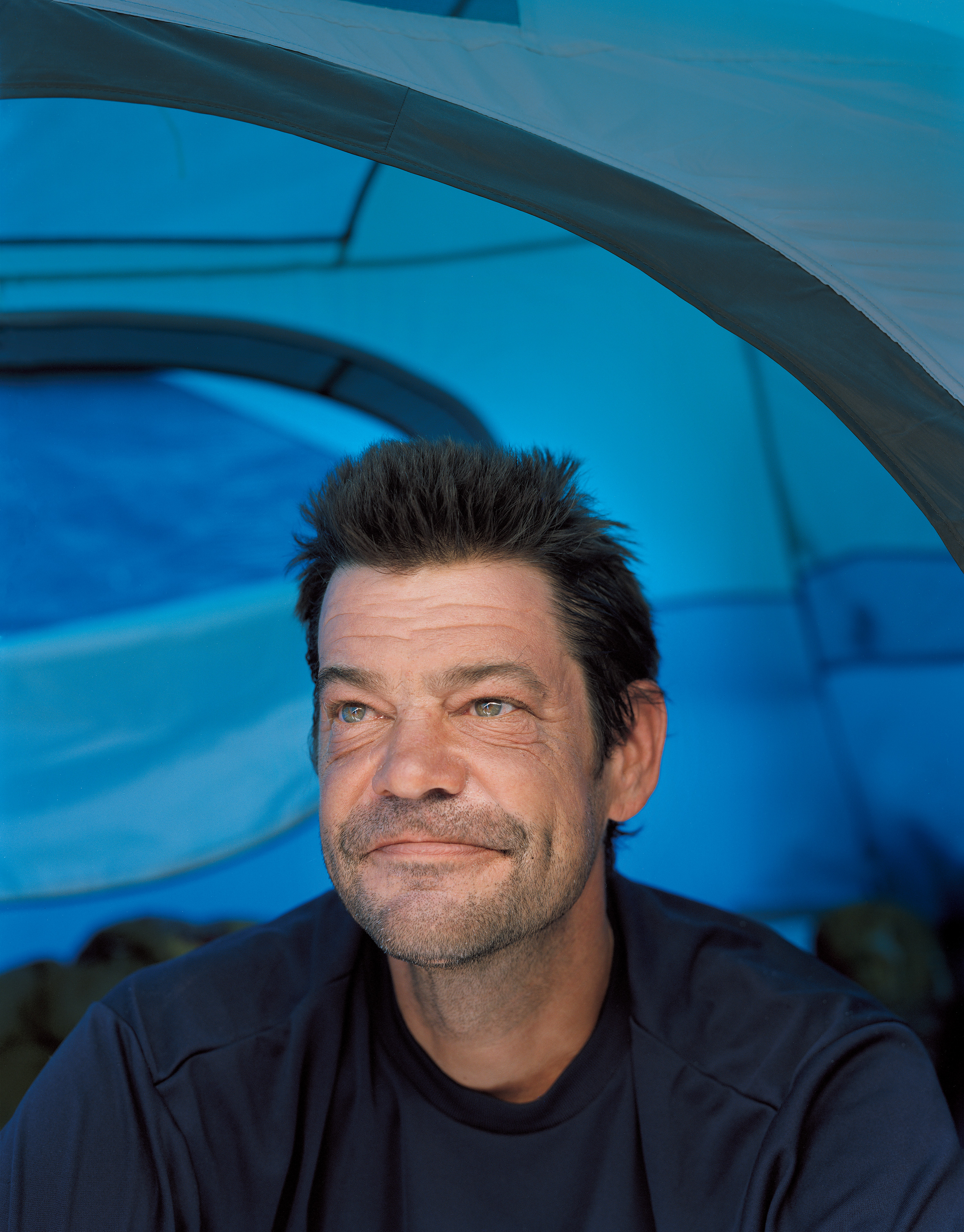Across the country, tent cities are a controversial approach to helping the homeless. Preferred by some bureaucrats as a way of cleaning up the streets, and by some homeless people because they offer a sense of community as well as a sliver of permanence in an otherwise mobile lifestyle, they are often criticized for creating neighborhood eyesores, increasing fire danger and crime, and undermining other programs that aim to help the homeless find housing and jobs. Photographer Eirik Johnson saw something significant happening in tent cities of the Pacific Northwest, something he set out to explore by spending time with the residents, inside their ephemeral homes. Here are some of the stories he gathered from Seattle’s Tent City 3.
Tent City 3
Tent City 3 is a mobile, self-managed community of homeless men and women. Trash removal and port-a-potties are provided, as are daily bus tickets for residents There is a food preparation area, and volunteers bring hot meals most evenings.
Current Location: St. George’s Episcopal Church
Number of Residents: Up to 100
Year Established: 2000
Frequency of Relocation: Every 90 to 120 days
Sponsoring Agencies: Seattle Housing and Resource Effort and Women’s Housing, Equality and Enhancement League
Legal Status: Operating under a City of Seattle ordinance that authorizes transitional encampments on religious-facility property
Annual Budget: $90,000
Number of People Served Since 2000: More than 5,500

Catie and Marc Have Been in Seattle for Seven Weeks
Marc had a stroke 18 months ago. We were [about] to be homeless in Oklahoma, with the lack of resources in that state. We researched and researched and researched — we researched eight different states actually. We tried really hard to settle on a place. I found out that there are some good [multiple sclerosis] doctors out here. Marc’s transgender also, so that makes it even more exciting trying to find good health care that’s going to treat him like a him as opposed to treating him like a her. We liked a lot of things about Seattle, and this, as a homeless option, was better because in most of the other states we were going to be split up into a male dorm and a female dorm.
We help each other a lot because of our lack of physical abilities. Sometimes he does more for me and sometimes I do more for him. It just helps us get by.
Home is anywhere that I am with Marc. It doesn’t matter if it’s a tent, it doesn’t matter if it’s a sleeping bag under a bridge. I would prefer it to be in four walls made of either plaster or concrete, but nothing’s perfect.

Sonny Moved to Seattle From San Diego Five Months Ago
You’re not really unclean, but you’re not clean. People look down on you like you’re lower than what they are. Yes, they have shelters and stuff. I have a friend who lives on the streets of San Diego. She can’t get into a shelter because she’s got three dogs. They’re her kids. And I can tell you, down there, there’s been 26 deaths. Homeless killing homeless. At least up here they have the remembrance program. They remember everybody who dies out here on the streets.
If you have a tent city like this, at least you can be safe. Nobody understands that. Everybody thinks the tent cities are just a waste of time. Yes, they don’t make us get into housing. They don’t make us get into counseling. That’s our choice. But they do provide us a safe, comfortable place that we can stay where we don’t have to move all of our shit with us every time we go somewhere. If I wanted to, I could leave my stuff here and go out and find a job and not have to worry about it.
People get pissed off because there are tents all over the place. Well, if you look at the amount of available housing in Seattle, there is not enough for everybody that’s homeless. We’ve had 265 people [so far this year], and, of those 265, we’ve had 10 [families] move into permanent housing.
If you could get people to think: “If I go to a tent city I’ve got food coming in almost every day. I’ve got the ability to leave my stuff and don’t have to worry about it getting ripped off.” That gives people more confidence in how they want to take care of themselves. So why are you cutting funding? All tent cities are pretty much self-managed, and most of the stuff that’s in tent cities comes from people donating. At least if they’re here, they’re going to be safer than out there. I think tent cities are very much needed in every city across the country.

Clint and Deanne Came to Seattle Together in 2011
I met Deanne in Alabama in 2009. My mom had passed away in January and I met her in July. I got very, very, very depressed when my mom passed. I kind of spiraled out of control with drug use and alcoholism. I watched her die right in front of me. It took me down.
[Deanne and I] hit it off rather well, and spent the honeymoon days with a little too much partying — I guess especially on my part. I was hiding the pain I felt from my mother’s loss. We did party a lot, but ultimately she saved my ass.
It’s hard to be on the streets. When we were in Alabama, we were never on the streets like this. My dad lived there and we always had a place. Once we moved up here, my drug addiction kind of got out of control. I kind of took her down with me. I’m just being honest. Eventually she was the only person on the planet who could get me to quit drinking. God sent me to her for a reason.

Pete Was Born and Raised in Seattle. Three Years Ago He Lost His House and His Family to Drinking. He’s Been Homeless for a Year and a Half.
I’ve talked to a lot of homeless people and some have been out here eight years, five years. I don’t know how they can do it. It amazes me. It really does. I’m a recovering drug addict, but I quit 20 years ago. Opioids and amphetamines. I was able to kick that, and I quit drinking too for six months. Then I just decided it was OK to drink again. I still can’t figure out why. Over time, I did it too much.
Last job before I was homeless was special-projects manager at a dental supply company. I worked in dental supplies for 28 years. I’ve done everything from shipping, receiving, warehouse management, customer service management, purchasing management, accounts payable, accounts foreseeable.
[After we lost the house,] me and my now ex-fiancée and my kids got an apartment on this hill right here, and I was there for about a year and a half before it was noticeable that my addiction was affecting the family in a negative way, and I needed to go. So I moved out January 2nd and had a place for a while. February 23rd I decided that I needed to just become homeless and deal with my situation. It scared the crap out of me. I lived in a bush on top of a hill for a long time.
I was actually employed until July 3rd, and then I got laid off. July 7th I attempted to kill myself, but I got saved by the weirdest thing in the world. I had a cat a couple years ago, before she ran away. And I’m walking down to the train bridge to end everything, and out comes this cat. And I look at her, and I’m like, What the? I start singing the song I used to sing to her — I rescued her, and it took me four or five days to get her out of the corner and up onto the bed. She just huddled until I kept singin’ and singin’ and then she came. And she sat in my lap and purred. Instead of going to the train bridge I turned around and came back.
Everybody got here in a different way. Losing the house was the dumbest thing I ever did. I did a lot of work on that house. Top to bottom, rewire, replumb. I didn’t want to lose it. To an extent, right now, I’m home because of people I’ve met. High school was probably the last time I made this many friends. Now I know people that have diseases, have trouble, and they’re all quality people. I like them a lot. I want the best for them. I have more close friends now than when I was working all the time and had my family — which I adore, and am really mad that I lost. I would love to have a spot where I can call my kids and say Hey, come over for the night or Let’s watch TV or I’ll make you dinner or something like that. That would be home to me.

These interviews have been edited and condensed.





